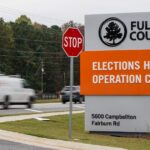
Authored by Sam Raus via RealClearPolitics,
More than 40 million Gen Z voters will be eligible to vote this November. For context, that’s more eligible voters than the population of California. And while often characterized as extremely progressive, college kids could shock Boomers with their presidential ballots. This fall, the iPhone generation might ultimately seek accountability for the leaders responsible for school closures, social distancing, and vaccine mandates.
As mainstream media zeroes in on Trump’s conviction in the New York hush money case, figures like Anthony Fauci, Andrew Cuomo, Phil Murphy and Gavin Newsom are largely let off the hook. Pandemic memories have taken a back seat to hot-button issues including abortion, the Oct. 7 attacks on Israel, the Ukraine-Russia war, immigration, Trump’s and Biden’s personal struggles, and economics. But the social and academic fallout of “Zoom University” lingers in young voters’ minds as they see graduations canceled and cities littered by protestors yet again.
Reckoning with the COVID era offers an opportunity for leadership in 2024. While the Dobbs decision overshadowed pandemic policies in the 2022 midterms, this fall, elected officials should highlight the fallout of quarantine regulations, emphasizing the lasting impact of prolonged social isolation, financially irresponsible aid packages, and more.
Over the past year, Congress revisited the stain left on America by the pandemic. Once deemed a conspiracy theory, information on the potential Wuhan lab origins of the coronavirus was declassified last year after President Biden signed Sen. Josh Hawley’s unanimously passed COVID-19 Origin Act of 2023. This past week, legislation introduced by Sen. Eric Schmitt, Rep. Troy Balderson, and Rep. Kevin Hern aims to review the misallocation of COVID relief money by the Department of Treasury in response to inflation concerns. A bipartisan bill by Sen. Gary Peters seeks to create a permanent “Government Spending Oversight Committee” to replace the temporary “Pandemic Response Accountability Committee.”
While news headlines and social media overlook the by-products of COVID-19, legislators from both parties seem engaged in discussions over the fiscal mismanagement and various socioeconomic consequences of closing life as we knew it. Although foreign relations and culture wars are expected to dominate voters’ attention, Americans remember what happened only yesterday, particularly those who saw formative years ripped away by pandemic politics. Legislators up for reelection in November would be wise to pick up on this and call for accountability for COVID-19 failures and transparency going forward.
Biden likely will frame his administration as a “return to normal,” given that he took office as vaccines began to roll out for the elderly and lockdown restrictions eased across the country. Nevertheless, the White House strikes no distance from Democratic governors such as Gov. Newsom and Gov. Murphy who endorsed school closures and vaccine mandates. As the president already struggles with youth voters due to his careful alignment with Israel and vaccine skeptic progressives flocking to Robert F. Kennedy Jr., the Biden campaign may want to pass on tapping Newsom or Murphy as surrogates this cycle.
Conversely, Gen Z voters may prove more sympathetic than expected to outspoken lockdown critics like Gov. Greg Abbott and Gov. Ron DeSantis. Despite sharing firm disagreements on cultural issues, most notably abortion and LGBT issues, droves of young people – myself included – fled the Northeast and California for an in-person college experience in the South. If Republicans want to make amends with the next generation of American voters, they should start by emphasizing depolarized topics such as quality education, social opportunities, and mental health.
Whether they’re running for president or lower office, candidates in 2024 should adopt stronger rhetoric condemning the fiscal and public health fecklessness of four years ago. Legislation is needed to ensure transparency in scientific research, the defense of civil liberties, and the preservation of economic prosperity. Furthermore, future Congress and White House cabinet members have a social responsibility to better question authority, rushed conclusions, and media narratives. A shadow of the pandemic lurks over this election. The ultimate victors will be those who leverage it.
Don’t underestimate the fury of a graduate scorned.
Sam Raus is a Young Voices Contributor studying public relations and political science at the University of Miami. His commentary has appeared in RealClearDefense, The Daily Caller, The National Interest, and RealClearWorld, Follow him on Twitter: @SamRaus1
Authored by Sam Raus via RealClearPolitics,
More than 40 million Gen Z voters will be eligible to vote this November. For context, that’s more eligible voters than the population of California. And while often characterized as extremely progressive, college kids could shock Boomers with their presidential ballots. This fall, the iPhone generation might ultimately seek accountability for the leaders responsible for school closures, social distancing, and vaccine mandates.
As mainstream media zeroes in on Trump’s conviction in the New York hush money case, figures like Anthony Fauci, Andrew Cuomo, Phil Murphy and Gavin Newsom are largely let off the hook. Pandemic memories have taken a back seat to hot-button issues including abortion, the Oct. 7 attacks on Israel, the Ukraine-Russia war, immigration, Trump’s and Biden’s personal struggles, and economics. But the social and academic fallout of “Zoom University” lingers in young voters’ minds as they see graduations canceled and cities littered by protestors yet again.
Reckoning with the COVID era offers an opportunity for leadership in 2024. While the Dobbs decision overshadowed pandemic policies in the 2022 midterms, this fall, elected officials should highlight the fallout of quarantine regulations, emphasizing the lasting impact of prolonged social isolation, financially irresponsible aid packages, and more.
Over the past year, Congress revisited the stain left on America by the pandemic. Once deemed a conspiracy theory, information on the potential Wuhan lab origins of the coronavirus was declassified last year after President Biden signed Sen. Josh Hawley’s unanimously passed COVID-19 Origin Act of 2023. This past week, legislation introduced by Sen. Eric Schmitt, Rep. Troy Balderson, and Rep. Kevin Hern aims to review the misallocation of COVID relief money by the Department of Treasury in response to inflation concerns. A bipartisan bill by Sen. Gary Peters seeks to create a permanent “Government Spending Oversight Committee” to replace the temporary “Pandemic Response Accountability Committee.”
While news headlines and social media overlook the by-products of COVID-19, legislators from both parties seem engaged in discussions over the fiscal mismanagement and various socioeconomic consequences of closing life as we knew it. Although foreign relations and culture wars are expected to dominate voters’ attention, Americans remember what happened only yesterday, particularly those who saw formative years ripped away by pandemic politics. Legislators up for reelection in November would be wise to pick up on this and call for accountability for COVID-19 failures and transparency going forward.
Biden likely will frame his administration as a “return to normal,” given that he took office as vaccines began to roll out for the elderly and lockdown restrictions eased across the country. Nevertheless, the White House strikes no distance from Democratic governors such as Gov. Newsom and Gov. Murphy who endorsed school closures and vaccine mandates. As the president already struggles with youth voters due to his careful alignment with Israel and vaccine skeptic progressives flocking to Robert F. Kennedy Jr., the Biden campaign may want to pass on tapping Newsom or Murphy as surrogates this cycle.
Conversely, Gen Z voters may prove more sympathetic than expected to outspoken lockdown critics like Gov. Greg Abbott and Gov. Ron DeSantis. Despite sharing firm disagreements on cultural issues, most notably abortion and LGBT issues, droves of young people – myself included – fled the Northeast and California for an in-person college experience in the South. If Republicans want to make amends with the next generation of American voters, they should start by emphasizing depolarized topics such as quality education, social opportunities, and mental health.
Whether they’re running for president or lower office, candidates in 2024 should adopt stronger rhetoric condemning the fiscal and public health fecklessness of four years ago. Legislation is needed to ensure transparency in scientific research, the defense of civil liberties, and the preservation of economic prosperity. Furthermore, future Congress and White House cabinet members have a social responsibility to better question authority, rushed conclusions, and media narratives. A shadow of the pandemic lurks over this election. The ultimate victors will be those who leverage it.
Don’t underestimate the fury of a graduate scorned.
Sam Raus is a Young Voices Contributor studying public relations and political science at the University of Miami. His commentary has appeared in RealClearDefense, The Daily Caller, The National Interest, and RealClearWorld, Follow him on Twitter: @SamRaus1
Loading…





